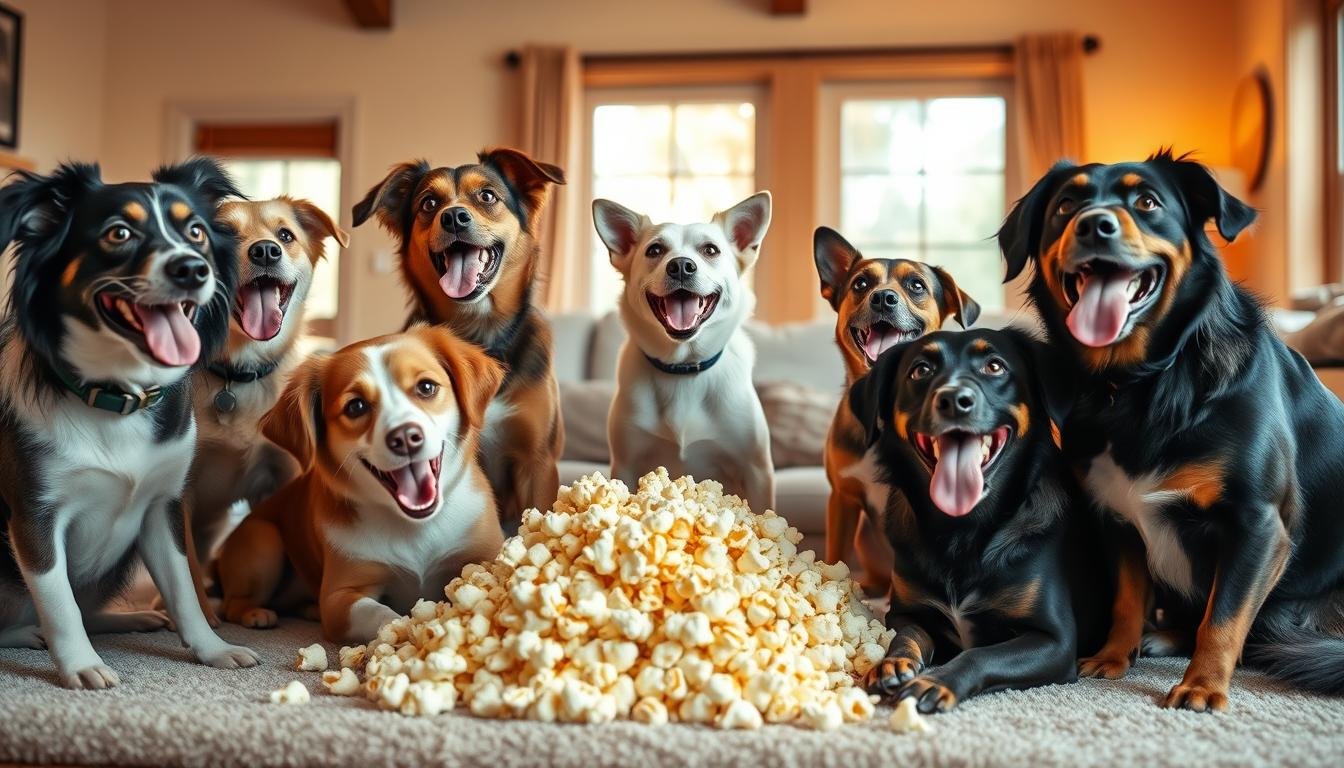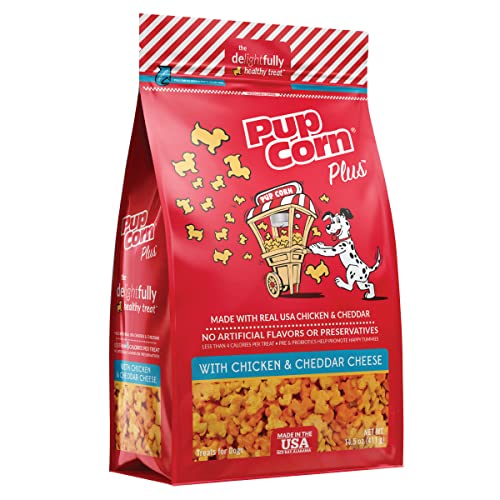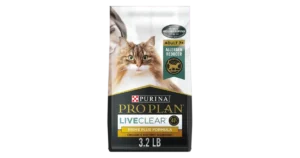Popcorn can be a tasty and fun snack for humans, but Can Dogs Eat Popcorn? The good news is, yes, plain popcorn without any added butter, salt, or seasoning is generally safe for dogs in moderation. It can even provide a low-calorie treat with a satisfying crunch! However, as with any snack, it’s essential to be mindful of portion sizes and avoid flavoured popcorn, as additives and oils can harm your furry friend. In this post, we’ll dive deeper into the potential benefits and risks of giving popcorn to your dog.
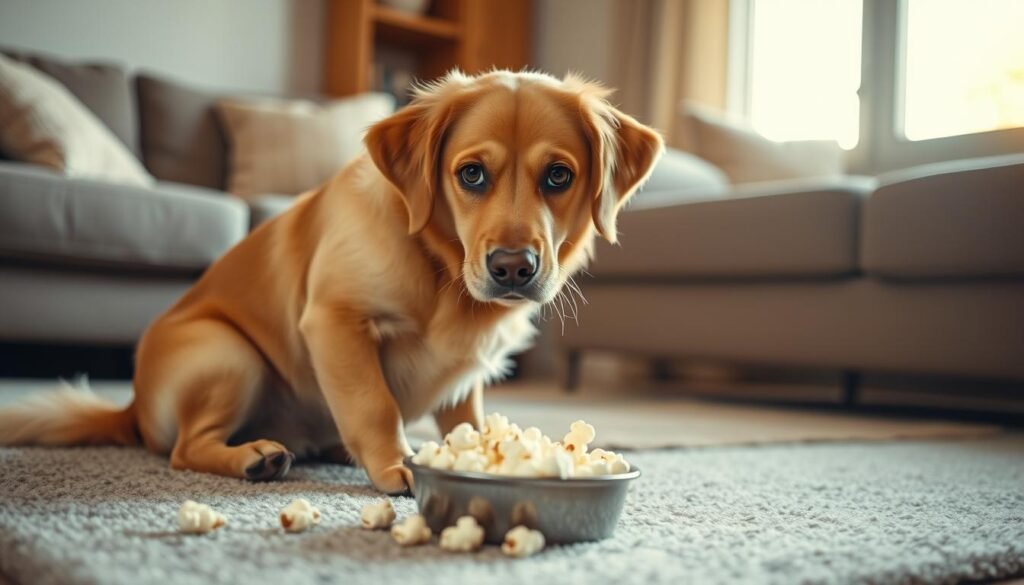
The Truth About Dogs and Popcorn
When it comes to sharing snacks with your dog, it’s essential to understand the implications of dogs eating popcorn. While it might seem harmless to share your favorite movie snack with your furry friend, there are several factors to consider before doing so.
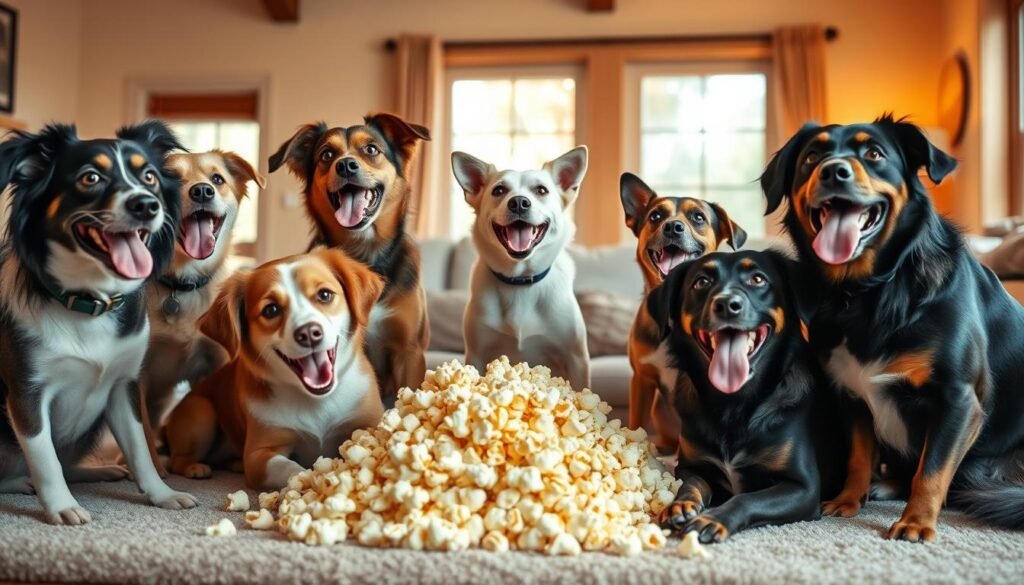
What Happens When Dogs Eat Popcorn
When dogs eat popcorn, the kernels can cause a range of issues. Unlike humans, dogs process corn products differently, and the kernels can be difficult for them to digest. As the kernels move through the digestive tract, they can cause discomfort, including an upset stomach. In some cases, the kernels may pass through the system without issue, but they can also get stuck in the digestive tract or cause inflammation.
- The physiological process of dogs consuming popcorn involves the kernels being swallowed and entering the digestive system.
- Dogs may experience discomfort due to the difficulty in digesting corn products.
- The kernels can potentially cause inflammation or get stuck in the digestive tract.
Why Dogs Are Attracted to Popcorn
Dogs are often drawn to popcorn due to its appealing smell and crunchy texture. The smell of popcorn, especially when buttered, is particularly enticing to dogs due to their enhanced sense of smell. Additionally, dogs are social animals that often want to share in their owner’s experiences, such as watching a movie. They may associate popcorn with positive experiences and therefore be drawn to it.
The difference between a dog’s natural dietary needs and their acquired taste for human snacks like popcorn can lead to confusion for pet owners. Dogs learn to associate certain foods with positive experiences, which increases their desire for these treats.
Can Dogs Eat Popcorn?
As a dog owner, you might wonder if sharing your popcorn with your furry friend is safe. The answer is Yes. But depends mainly on the type of popcorn and how it’s prepared. While popcorn is not toxic to dogs, the additives and preparation methods can harm it.
Plain vs. Flavored Popcorn
Plain, air-popped popcorn is generally safe for dogs to eat in small quantities. However, flavored popcorn varieties are a different story. Butter, salt, caramel, and cheese are common flavorings that can be problematic for canine health. Butter and cheese, for instance, are high in fat, which can lead to pancreatitis in dogs. Salt can cause electrolyte imbalances, and caramel can be toxic due to its high sugar content and potential presence of xylitol.
When comparing plain popcorn to flavored varieties, it’s clear that plain is the only safe option for dogs. Even then, it’s crucial to introduce it in moderation to prevent digestive upset.
| Popcorn Type | Safety for Dogs | Reason |
|---|---|---|
| Plain, Air-Popped | Safe in moderation | No additives |
| Flavored (Butter, Salt, etc.) | Not safe | Harmful additives |
| Microwave Popcorn | Not safe | Chemicals and preservatives |
Air-Popped vs. Microwave Popcorn
The method of popping corn also affects its safety for dogs. Air-popped popcorn is a healthier option because it doesn’t involve the use of harmful chemicals or excessive oils. On the other hand, microwave popcorn contains chemicals like perfluorooctanoic acid (PFOA) and diacetyl, which are used in the lining of microwave bags and can be harmful to dogs.
Furthermore, the oils used in microwave popcorn can cause digestive issues in dogs. Even without additional toppings, microwave popcorn is not a safe treat for your dog.

In conclusion, while dogs can eat plain, air-popped popcorn in moderation, it’s essential to avoid flavored and microwave popcorn due to the potential health risks associated with their ingredients and preparation methods.
Potential Health Risks of Popcorn for Dogs
Feeding your dog popcorn may seem like a harmless treat, but it poses several health risks that you should be aware of. While an occasional piece of popcorn is unlikely to cause harm, regular or excessive consumption can lead to various health issues in dogs.
Choking Hazards from Kernels
One of the most significant risks associated with dogs eating popcorn is the choking hazard posed by unpopped or partially popped kernels. These kernels can become lodged in a dog’s throat, creating a dangerous situation, especially for smaller breeds. Moreover, kernels can get stuck between teeth or in gums, potentially leading to dental issues or discomfort.
If your dog ingests a kernel, it’s essential to monitor them closely for signs of distress, such as gagging, coughing, or difficulty swallowing. If you notice any of these symptoms, it’s crucial to seek veterinary attention immediately.
Digestive Issues and Upset Stomach
Consuming popcorn can also lead to digestive problems in dogs, including gas, bloating, and constipation. The hard and fibrous nature of kernels can make them difficult for dogs to digest, potentially causing an upset stomach. If your dog experiences persistent digestive issues after eating popcorn, it’s best to consult with your veterinarian for advice.
Corn Allergies in Dogs
Corn is one of the most common food allergens in dogs. If your dog is allergic to corn, consuming popcorn can trigger an allergic reaction. Symptoms of a corn allergy may include skin irritations, such as itching or redness, and gastrointestinal distress. If you suspect your dog has a corn allergy, it’s essential to consult with your veterinarian to determine the best course of action.
Dangers of Butter, Salt, and Other Toppings
While plain popcorn can be a relatively safe treat for dogs in moderation, the addition of butter, salt, and other toppings can significantly increase the health risks. These additives can lead to serious health issues, including pancreatitis, sodium ion poisoning, and obesity. Even small amounts of these additives can accumulate and cause problems for dogs, especially when consumed regularly.
Furthermore, many commercial popcorn products contain artificial flavorings that may be toxic to dogs. It’s crucial to be mindful of the ingredients and toppings used in the popcorn you share with your dog, or better yet, avoid them altogether.
Nutritional Benefits of Plain Popcorn
The nutritional benefits of plain popcorn for dogs are rooted in its mineral and fiber content. While it’s not a substitute for a balanced diet, plain, air-popped popcorn can be a nutritious occasional treat.
Minerals and Vitamins in Popcorn
Plain popcorn is a source of several important minerals, including magnesium, manganese, phosphorous, and zinc. These minerals play crucial roles in various bodily functions in dogs. For instance, magnesium and phosphorous are vital for bone health, while zinc supports the immune system and metabolic processes.
Popcorn also contains trace amounts of vitamins, although these are typically obtained in sufficient amounts through a dog’s regular, balanced diet. Nonetheless, the presence of these nutrients in popcorn adds to its potential benefits as an occasional treat.
| Mineral | Role in Canine Health |
|---|---|
| Magnesium | Supports bone health and energy production |
| Manganese | Involved in bone formation and metabolic processes |
| Phosphorous | Crucial for bone health and many biological processes |
| Zinc | Essential for immune function and wound healing |
Fiber Content and Digestive Health
The fiber content in plain popcorn can positively impact a dog’s digestive health when consumed in moderation. Dietary fiber helps regulate bowel movements and can aid in weight management by making your dog feel fuller for longer.
However, it’s essential to remember that while popcorn can contribute to a dog’s fiber intake, it should not be relied upon as a primary source of nutrition. A balanced, high-quality dog food should always be the mainstay of your dog’s diet.
In conclusion, while plain, air-popped popcorn is not a nutritional powerhouse for dogs, it does contain beneficial minerals and fiber. These nutrients can support various aspects of canine health, from bone health to digestive regularity, when consumed in appropriate amounts.
How to Safely Feed Popcorn to Your Dog
To ensure your dog enjoys popcorn without any adverse effects, you need to be aware of the proper serving methods. Feeding your dog popcorn can be a fun experience for both you and your pet, but it’s crucial to prioritize their safety and health.
Proper Preparation Methods
The first step in safely feeding popcorn to your dog is to prepare it correctly. Always opt for air-popped popcorn without any added oils, butter, or seasonings. You can air-pop popcorn using a popcorn machine, microwave, or a pan on your stovetop. Once the popcorn is ready, carefully remove any unpopped or partially popped kernels to prevent choking hazards.
Here’s a simple step-by-step guide to preparing air-popped popcorn for your dog:
- Pop the popcorn using your preferred method.
- Sort through the popped popcorn to remove any unpopped kernels.
- Serve the plain, air-popped popcorn to your dog in moderation.
Appropriate Serving Sizes
When it comes to serving popcorn to your dog, less is more. Treats, including popcorn, should not exceed 10% of your dog’s daily caloric intake. The serving size will vary based on your dog’s size, breed, and overall health. Here’s a general guideline for serving sizes:
| Dog Size | Serving Size |
|---|---|
| Small Dogs (<20 lbs) | 1-2 pieces |
| Medium Dogs (21-50 lbs) | 2-5 pieces |
| Large Dogs (>50 lbs) | 5-10 pieces |
Monitoring Your Dog After Eating Popcorn
After serving popcorn to your dog, it’s essential to monitor their behavior and health closely. Watch for signs of digestive distress or allergic reactions, such as vomiting, diarrhea, or itching. If you notice any adverse symptoms, contact your veterinarian immediately.
To minimize risks, avoid giving your dog popcorn with added salt or other toppings, and never use popcorn as a replacement for regular meals. By being mindful of these guidelines, you can safely share popcorn with your dog as an occasional treat.
Signs Your Dog Is Having a Negative Reaction
It’s essential to watch your dog carefully after they’ve consumed popcorn to catch any negative reactions promptly. While popcorn might seem like a harmless snack, it can cause discomfort or more serious health issues in dogs.
Digestive Symptoms to Watch For
After your dog has eaten popcorn, it’s crucial to monitor their digestive health. Common symptoms that might indicate your dog is having trouble with popcorn include vomiting, diarrhea, excessive gas, and abdominal discomfort. These symptoms can range from mild to severe and may not always appear immediately.
If your dog exhibits any of these signs, it’s essential to assess the severity. Mild digestive upset might resolve on its own, but more severe symptoms require immediate veterinary attention. For instance, if your dog is experiencing persistent vomiting or diarrhea, it could lead to dehydration, a condition that necessitates prompt medical care.
When to Contact Your Veterinarian
Knowing when to seek veterinary help is crucial. If your dog shows signs of choking, severe lethargy, or allergic reactions after eating popcorn, you should contact your veterinarian immediately. Allergic reactions can be particularly dangerous and may manifest as swelling, hives, or difficulty breathing.
When you contact your vet, it’s helpful to have certain information ready. Be prepared to describe the amount and type of popcorn your dog consumed, the symptoms you’re observing, and any other relevant health information about your dog. This will help your veterinarian provide the most appropriate advice or treatment.
Monitoring your dog’s stool for signs of undigested kernels or other abnormalities is also a good practice. If you notice any unusual signs or if your dog’s condition worsens, don’t hesitate to seek professional advice. Remember, it’s always better to err on the side of caution when it comes to your pet’s health.
Healthier Alternatives to Popcorn for Dogs
For dog owners seeking a popcorn alternative, several healthy options can satisfy your pup’s snack cravings. While popcorn can be a fun snack, there are risks associated with it, such as choking hazards and digestive issues. Fortunately, there are numerous dog-safe snacks that can provide a similar experience without the risks.
Dog-Safe Snacks with Similar Texture
If your dog enjoys the crunchy texture of popcorn, consider these alternatives. Carrot sticks and apple slices are not only safe for dogs but also provide a satisfying crunch. Cucumber pieces are another refreshing option. These snacks are easy to prepare and can be served raw or lightly steamed to enhance their palatability.
Commercial dog treats designed to mimic the crunch of popcorn are also available. Look for products made from wholesome ingredients and formulated for canine digestive systems. Always check the ingredient list and nutritional content to ensure they align with your dog’s dietary needs.
Nutritious Treats Your Dog Will Love
Homemade dog treats can be a fun and healthy way to include your dog in snack time. Consider making peanut butter biscuits or sweet potato chews. These treats are not only delicious but also packed with nutrients. When preparing homemade treats, use dog-safe ingredients and avoid adding harmful substances like chocolate or xylitol.
Remember, treats should make up no more than 10% of your dog’s daily calorie intake. Overfeeding can lead to obesity and other health issues. By choosing the right snacks and controlling portion sizes, you can keep your dog happy and healthy.
Conclusion: Making the Right Snack Choices for Your Dog
As you consider sharing your movie night snacks with your dog, it’s essential to understand the implications of dogs eating popcorn. Throughout this article, we’ve explored the various aspects of popcorn consumption by dogs, from the potential health risks to the nutritional benefits.
While plain, air-popped popcorn in small amounts may be safe for dogs, it’s crucial to remember that it offers minimal nutritional benefits and comes with potential risks, such as choking hazards from kernels and digestive issues.
To keep your pet safe, making informed decisions about what human foods to share is vital. This includes being aware of the toppings and salt used on popcorn, which can harm dogs. Treats should not exceed 10% of your dog’s daily caloric intake to prevent obesity and related health issues.
Before introducing any new human foods to your pet’s diet, especially if they have existing health conditions, it’s advisable to consult with your veterinarian. This responsible approach to pet care ensures your dog remains healthy and happy.
Creating special “movie night” routines that include appropriate treats for your dog can be a great way to include them in family activities without risking their health. By making informed choices, you’re showing your pet love and care in the best possible way.
Ultimately, the joy of responsible pet ownership comes from making choices that support your dog’s health and longevity. By being mindful of what you share with your dog, you can enjoy movie nights together, knowing you’re keeping them safe.

